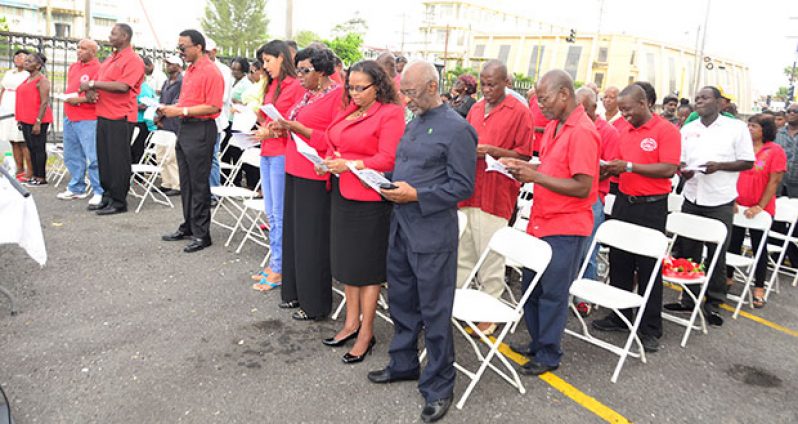PRESIDENT of the Guyana Trades Union Congress (GTUC), Norris Witter, has called for cohesion among labour, employers and the state in ensuring that workers’ rights and interests are seen as vital to the development of the country.Speaking on Sunday at a ceremony to honour the Father of Trade Unionism, Hubert Nathaniel Critchlow, Whitter said Guyana will never realise its full potential until unity is strengthened among the working people, and until there is a push for a people-centred national development strategy.

“Guyana will not progress and realise her full potentials unless the working people are united and demand of their leaders, in all affairs, an agenda that is focused on people’s development — a national development strategy of the people, by the people, and for the people.”
Noting his disappointment that the present administration has not yet addressed the contentious wages and salaries’ issue that has for years bedevilled the local public sector, Witter said: “I am concerned that any administration will pay themselves first and then consider what the poor workers of this country should receive.
“I am also concerned that since the presentation of the budget in January of this year, no serious effort has been taken to engage the unions within the public service and public sector to arrive at a determination, particularly as it relates to salary and wages.”
Using an old adage to drive home his point, Witter said: “Let us not arrive at the point where while the grasses grow, the horse is dead!”
He feels that ideally, labour, employer and state should be social partners in deciding, as a matter of urgency, a recalibration of their relationship, as a “paradigm shift” in such relationships is vital for the survival of Guyana.
“We cannot continue to go down the road of conflict and confrontation,” Witter said. “Adversarial relationship is counter-productive; it is time we make that shift along the continuum to a relationship of cooperation; to a relationship of collaboration. We must take that bold step in taking each other into our confidence.
“I think there is too much of distrust, deceit and suspicion. We have to eschew those things.”
Unions, he said, have already taken that bold step, and are putting together a massive action programme driven by workers and labour agenda, but “the never-ending struggle for the protection, preservation and promotion of the rights of the working class is as perennial as the grass.”
He said that, sadly, Guyana has witnessed and experienced successive administrations making promises to working people of a better life than what had obtained under their predecessor, but they deceive and disappoint the people instead. As such, he said, the united workers movement can never trust any administration, since their motivations and mandates differ.

“The leaders of this great movement cannot rely on the benevolence of any administration, whether you support that administration or not. Their motivation is different to ours; their mandate is different to ours. We have witnessed within recent times the rolling back or erosion of gains won by workers through blood, sweat and tears.”
He said that, considering all of the foregoing, if the Trade Union Movement does not take stock of itself, and if its leaders are not prepared to fight tirelessly and make sacrifices, it can possibly become irrelevant and extinct.
He said trade union leaders have become less aggressive, and must use the struggles of Critchlow, among others, as a motivator to take up a position.
“The survival and advancement of this great movement will only be assured when the movement is led by comrades who are prepared to struggle, to suffer and to sacrifice. It seems to me that somewhere on our journey, we dropped that baton. We must retrieve it, grasp it firmly in our hands, lift it high, and continue, with heads held high, that journey that “Skibby, the ostrich” (and I’m talking about Hubert Nathaniel Critchlow) so proudly and courageously started.”
He said that while unity among the working class is vital, he is pleased that unity is reflected in the leadership of trade unions and participation of workers in related forums, as FITUG and the GTUC have decided to take a united front in the battle for workers’ rights, a front he is hoping that the GPSU will endorse and join.
Witter described Chritchlow as “leader extraordinaire, legend, indefatigable champion of the working class”, who led the way in ensuring the advancing of workers’ rights and influencing of socio-political trajectory of this country.
Critchlow, he said, was ‘the Father of the Trade Union Movement in Guyana and the Anglophone Caribbean.
At the ceremony, wreaths were laid at the foot of Critchlow’s statue, a monument within the Public Buildings Compound, by various organisations and government ministers.




.jpg)










